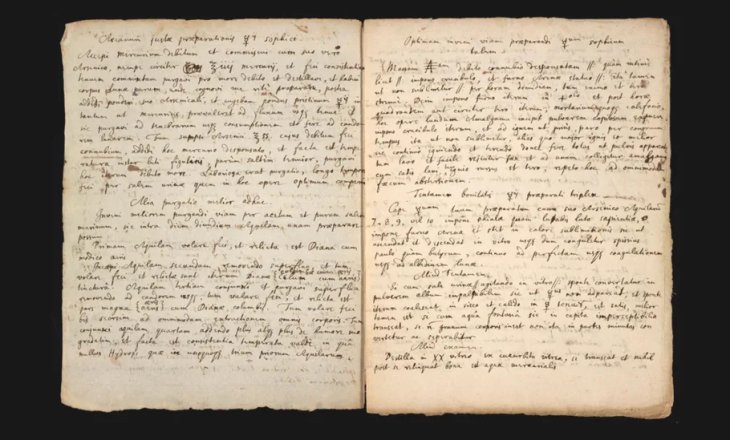Isaac Newton Was Apparently An Alchemist, Scientists Discovered
Anil - Sep 25, 2019

Scientists found Newton's recipe that describes in detail the method of creating 'sophick mercury'.
- Japan Hydrogen Breakthrough: Scientists Crack the Clean Energy Code with Mind-Blowing 1,000% Efficiency Jump
- 'Five-second rule' For Food Dropped On The Floor: Is It True?
- Scientists Want To Send 6.7 Million Samples, Including Sperm, To The Moon
For scientists, alchemy is not a topic of much concern, it has even been dismissed as a mystical, unreliable science. By contrast, well-known scientist Isaac Newton showed great interest in alchemy and spent his life writing millions of books about this pseudoscience. His desire was to use those insights to better explain the nature of the Earth.

Scientists have investigated the evidence of alchemical texts after finding the first-hand recipe of Philosopher's Stone written by the legendary scientist. Reported by National Geographic, they have rediscovered Newton’s manuscript, which is now owned by a non-profit organization located in Philadelphia, Pennsylvania, named the Chemical Heritage Foundation. The organization is uploading scanned images and transcriptions to a digital forum where people can access to Newton's alchemy heritage.
In the recipe, Newton described in detail the method of creating 'sophick mercury', which is a substance that plays a major role in the formation of Philosopher's stone. The stone is famous for its ability to turn base metals such as lead into gold or silver, which are precious metals.

It can be seen that Issac Newton, the initiative scientist of modern physics of mankind, who discovered the electromagnetic spectrum of light, was deeply influenced by alchemy. Although there has been no evidence showing that Newton actually created "sophick mercury," it is believed by the scientists that his manuscripts have great scientific significance in inspiring them to recognize that white light is a combination of many different colors.
In fact, it was an alchemist named George Starkey that inspired Newton for further study. Starkey invented a recipe relating to the distillation of mercury and then heated it with gold. The result of the recipe is an alloy with subtle, branched spurts. Although the exact relevance and significance of the invention have not been found, Newton was the first person to note the alchemy mechanism for the exploitation of lead ore. Currently, contemporary scientists have begun to generate Philosopher's Stone through some initial efforts, according to a science historian at Indiana University, William Newman.
Featured Stories

Features - Jan 29, 2026
Permanently Deleting Your Instagram Account: A Complete Step-by-Step Tutorial

Features - Jul 01, 2025
What Are The Fastest Passenger Vehicles Ever Created?

Features - Jun 25, 2025
Japan Hydrogen Breakthrough: Scientists Crack the Clean Energy Code with...

ICT News - Jun 25, 2025
AI Intimidation Tactics: CEOs Turn Flawed Technology Into Employee Fear Machine

Review - Jun 25, 2025
Windows 11 Problems: Is Microsoft's "Best" OS Actually Getting Worse?

Features - Jun 22, 2025
Telegram Founder Pavel Durov Plans to Split $14 Billion Fortune Among 106 Children

ICT News - Jun 22, 2025
Neuralink Telepathy Chip Enables Quadriplegic Rob Greiner to Control Games with...

Features - Jun 21, 2025
This Over $100 Bottle Has Nothing But Fresh Air Inside

Features - Jun 18, 2025
Best Mobile VPN Apps for Gaming 2025: Complete Guide

Features - Jun 18, 2025
A Math Formula Tells Us How Long Everything Will Live
Read more

ICT News- Feb 18, 2026
Google's Project Toscana: Elevating Pixel Face Unlock to Rival Apple's Face ID
As the smartphone landscape evolves, Google's push toward superior face unlock technology underscores its ambition to close the gap with Apple in user security and convenience.

Mobile- Feb 17, 2026
Anticipating the Samsung Galaxy S26 and S26+: Key Rumors and Specs
The Samsung Galaxy S26 series is on the horizon, sparking excitement among tech enthusiasts.

Mobile- Feb 16, 2026
Xiaomi Launches Affordable Tracker to Compete with Apple's AirTag
For users tired of ecosystem lock-in or high prices, the Xiaomi Tag represents a compelling, no-frills option that delivers core functionality at a fraction of the cost.
Comments
Sort by Newest | Popular